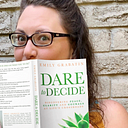Vulnerability vs Victim Mindset
Have you ever thought about the difference in feeling vulnerable versus feeling like a victim?
Most of my 20’s I spent feeling vulnerable, insecure and powerless. Not because I had an oppressive life but because of my expectations.
My conflicting expectations dictated that I would work hard but that my life’s special path with show up like a surprise party one day. I’d work diligently helping others, and maybe one day someone would see something I didn’t see in myself, tell me which life’s goal to pursue, and give me opportunities in a golden basket.
I didn’t realize until years later that I’d been stuck in a victim mindset, thinking life happens to me instead of for me.
The last month I’ve been writing a part of my book that takes me back to the year my first husband left our marriage. It brought back a flood of memories of feeling vulnerable and powerless.
Yet, that was one of the most empowering seasons of my life spiritually, emotionally and mentally. When he left and I was an emotional wreck, I wanted an instruction guide. I wanted to know how to walk through this kind of devastation and repair it all. But, as kind, compassionate friends and my church community reached out to help me, I realized no one really knew what to say or do about it. That was startling to me — and I felt even more helpless.
However, I refused to stay at rock bottom or repeat mistakes that landed me there. So I leaned into my pain and imperfections. I let God guide my healing path through books, journaling, prayer, counselling and the people He sent my way.
In that season of vulnerability, my pastor once commented that he sensed a “resolve as strong as an oak tree.” Amid some well-meaning advice-givers and bitter victims working through their own junk who saw what they wanted to see, I needed to hear that someone saw strength in me.
Here’s what I’ve noticed about my victim mindset:
- the state of being or feeling vulnerable or uncertain invites unpleasant feelings
- because you feel weak or helpless, you begin to believe that you are
- sometimes having vulnerabilities attracts people who need to be needed, feel like their opinion is the most important thing you need or have control issues
- because you believe you are powerless, you listen to or comply with anyone who has more power, stronger opinions or insistent advice
- because you had to accept help and couldn’t figure it out on your own, you feel shame and even more helplessness
- rinse and repeat
Here’s what I’ve discovered about vulnerability from Brené Brown in her book Daring Greatly. It is:
- “the courage to let yourself be seen” [Brene Brown]
- a gift that invites connection with other safe humans at a heart level
- “the birthplace of love, belonging, joy, courage, empathy, and creativity. It is the source of hope, empathy, accountability, and authenticity. If we want greater clarity in our purpose or deeper and more meaningful spiritual lives, vulnerability is the path.”
- “not weakness; the uncertainty, risk, and emotional exposure we face every day are not optional. Our only choice is a question of engagement. Our willingness to own and engage with our vulnerability determines the depth of our courage and the clarity of our purpose; the level to which we protect ourselves from being vulnerable is a measure of our fear and disconnection.”
In other words, vulnerability doesn’t have to be a weakness; it can be strength and courage.
I did not and could not rise up as a leader until I shifted from victim to vulnerable. And each time I made a little choice to do so, how I influenced and inspired others shifted.
Friend, if you are feeling vulnerable in your #madeformore path today, know that you are strong and resilient.
Just because you’re frustrated that you can’t see 5 steps ahead doesn’t mean you’re not competent and faith-filled enough to fight through the one next step you know.
Just because you have #momguilt for wanting to spend more time on your goals doesn’t mean it defines you.
Just because you want to slack off on your business or dream so you can enjoy summer with your family doesn’t mean you aren’t worthy of your calling.
Just because you’re not getting the results you’ve been working so hard form, doesn’t mean it’s a life sentence.
Be you.
Notice what you feel.
Accept it.
And then make your wisest choice to take the action you know you won’t regret.
If you’d like help shifting out of the scarcity mindset of victimhood so you can get on with your calling, this 4-day video and workbook series is a great first step.
If this post got you thinking, please tap the clap button, follow me or share your thoughts in a response below.
